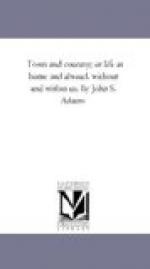There are many persons with whom it is the most difficult task of their existence to write a letter. They follow the old Latin writers, and make a labor of what with others is a recreation. They begin with the stereotyped words, “I take my pen in hand,” as though a letter could be written without doing so. Then follows, “to inform you that I am well, and hope this will find you the same.” There is a period-a full stop; and there are instances of persons going no further, but closing with, “This from your friend, John short.”
This “difficulty” arises not from an inability, but from an excessive nicety-a desire to write a prize essay, instead of a good, sociable, familiar letter. To make a letter interesting, the writer must transfer his thoughts from his mind to his paper, as truly as the rays of the sun place the likeness of an object in front of the lens through which it acts upon the silvered plate. Seneca says, “I would have my letters be like my discourses when we sit or walk together, unstudied and easy.”
Willis’ letters are of a kind always “free and easy.” His “Letters from Under a Bridge” are admirable specimens of letters as they should be; and his “Pencillings by the Way” owe much of their popularity to their easy, familiar, talkative style. The letters of Cicero and Pliny, of ancient, and Swift, Pope, Arbuthnot, Madame de Svign, and Lady Mary Wortley Montague, of modern times, are generally received as some of the best specimens extant of epistolary composition. The letters of Charles Lamb are a series of brilliances, though of kaleidoscope variety; they have wit without buffoonery, and seriousness without melancholy. He closes one of them by subscribing himself his friend’s “afflicted, headachey, sorethroaty, humble servant, Charles lamb.”
Some men, and women too, of eminence, have written curiosities in the form of correspondence. The letter of the mother of Foote is a good example of this kind of correspondence. Mrs. Foote became embarrassed, and, being unable to meet a demand, was placed in prison; whereupon she wrote to Mr. Foote as follows:
“Dear Sam: I am in prison for debt; come, and assist your loving mother, E. Foote.
It appears that “Sam” was equally entangled in the meshes of the law, for he answered as follows:
“Dear mother:-So am I; which prevents his duty being paid to his loving mother by her affectionate son,
“Sam Foote.
“P. S.-I have sent my attorney to assist you; in the mean time, let us hope for better days.”
These laconic epistles are well matched by that of a French lady, who wrote to her husband this missive of intelligence, affection, &c., &c.:
“I write to you because I have nothing to do; I end my letter because I have nothing to say.”
But these are left far in the rear by the correspondence of two Quakers, the one living in Edinburgh, the other in London. The former, wishing to know whether there was anything new in London, wrote in the corner of a letter-sheet a small interrogation note, and sent it to his friend. In due time he received an answer. He opened the sheet and found, simply, O, signifying that there was none.




